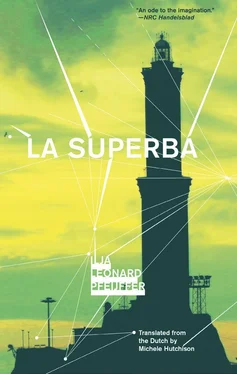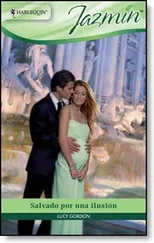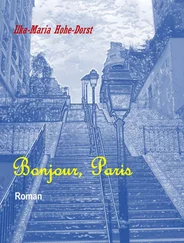The next game was to do an impression of Don. Elio, Boar, imitated how Don sang Sarah Vaughan’s “You are My Honeybee” to every girl who came in. ‘You are my honeybee, he sang, and he pricked her…’ He made the accompanying obscene gesture. “Get it? Pricked her…And then squeeze some tits. I’ll demonstrate. Look. Like this.” Boar squeezed a random friend of Don’s in the tits. But there was a degree of self-interest in it, I thought; it wasn’t just part of the imitation. From time to time, someone would fall off his chair, blind drunk. But in those cases, too, it wasn’t clear whether this was part of the game or whether it was due to the gin and tonic. But at the end of the day it came down to the same thing.
Don’s funeral gradually turned into Don’s birthday. And because at his own birthdays Don generally featured more as a shadowy presence than he was actually present as a concrete person, he was barely missed. He was there that day on the Piazza delle Erbe, there was hardly anyone who doubted that. And no one doubted it at all when, suddenly, spontaneously, without agreement or sign, across the square hundreds of voices joined together in his favorite song: We all live in a yellow submarine .
In the evening there was a passionate debate about how we could get the council, the province, or the region to replace a small, battered statue of a putto on the Piazza delle Erbe with a statue of Don holding a glass of gin and tonic. And when, hours later, after the legal closing time, the shutters rattled downwards and everyone stumbled home blind drunk, we heard Don’s piercing peals of laughter echoing through the city’s silent alleyways.
He was a living legend and it will be difficult for the city to get used to the fact that he is now a dead one. Smiling behind his sunglasses, he drank himself to death and laughingly invented a life story to go with it. The bum. The drunken bastard. He enticed all of us into the labyrinth of his fantasies. And he succeeded — he was the most popular immigrant, the most successful foreigner in the whole of Genoa because he never assimilated, never fit in, and always stayed himself. In fact he had refined himself into a caricature of himself. And on the day of his funeral, hundreds and hundreds of friends had drunk cappuccino senza schiuma while having serious conversations about a statue. Hundreds and hundreds of drunken voices had joined together to sing his favorite song. We all live in a yellow submarine. He had always known that it would end like this. Grande Don .
PART TWO. The Theater Elsewhere
1.
It’s like a bath. The plug’s in and the tap’s on. There’s nobody home. The person who turned on the tap has forgotten it. She’s gone out. Slowly but surely, the bath gets fuller and fuller. And it’s a cast iron certainty that at a certain point that can be calculated mathematically it will overflow, immediately causing a new situation because the apartment will be flooded and so will the downstairs neighbors’. That’s August.
The plug is plugged in the early springtime and the warm tap is turned on. Gradually, day after day, week after week, month after month, the city becomes filled with summer until, on a mathematicallycalculable day in August, when almost no one is home, it floods. It’s not that it’s only a bit warmer than the day before, the same as when a bath overflows, you can’t say that it’s only a bit fuller than before. The city suddenly becomes white with heat in August. And when the inhabitants return from holiday in September and rush to turn off the tap and pull out the plug, it takes another couple of months to mop up all that summer.
The August heat is aqueous. And I’m not referring to the sweat that pours from your forehead when you feel the urge to raise a slow hand to mop your forehead. Although it’s related to that. The water from the sea evaporates and has nowhere to go. Right behind the city, there are mountains. In other places in the world, you’re grilled or roasted at such high temperatures. Here you’re steam cooked in the hot vapors. From the mountains it looks like there’s mist hanging over the city. But in the city itself the sun shimmers. The mist is the air we breathe. In the city, this goes by the fairy-tale name of macaia , a word that can only be whispered, otherwise they’ll reach in through your open windows while you sleep and choke you with their soft hands. If the Genoese, who always complain about everything, complain about one thing more than anything else, it’s these clammy days and nights of suffocation that paralyze even your thoughts. Macaia is made up of the sighs of the Genoese.
The August heat is liquid. You stretch out in it like in a steam bath and immerse yourself in it. You swim through the city’s alleys. The heat is tangible. It streams between your fingers and over your skin as you drift on her slow waves. It takes three times as long to reach nearby destinations in the deserted city flooded with summer, such as the latteria on the corner, if it’s even open. Perhaps it’s better not to even try to find out.
I feel like a fish in water in the deserted, liquid city of August. While everyone who can afford it has fled to the coast or to the mountains, I try to survive in this shimmering post-apocalyptic playground, along with the rats and a few similarly minded. Nearly all the attractions are closed. We, the group of survivors, show solidarity and exchange information that could save each other’s lives, like the addresses of tobacconists that are still open. There’s nothing to do, but doing something has never been my strong point — it has never been my burning ambition. To be honest, I consider it a rather overrated concept, that whole palaver. And the paralyzing heat is the ideal excuse to dismiss every kind of plan in advance without anyone thinking to criticize you for it. And so I swim small laps in the alleyways, smiling, using minimal physical effort. I don’t need to go to the sea to swim.
2.
I’d already sent the previous letter when I realized I’d forgotten to tell you something important. Something that will interest you. Let’s not be coy.
Let me put it this way. When everyone’s at the beach, parading around in only their bikinis in front of overheated, thirsty eyes that try to melt away the little fabric in the way (even my style is becoming lewder and exhibitionistickier, if that’s a word, perhaps you noticed; I’ll have to smooth it all into the correct, Calvinistic form when I rework these notes into a novel, but in the meantime I’m enjoying the freedom to speak the truth, to you at least, in overheated terms, the naked truth, we might say, if you’ll permit me this lame pun, but all of this between parentheses), then the people left in the city try even harder. So as not to look left out. To make it look like a conscious decision to be in the city in this weather. I guess you don’t understand that. But what I mean is this:
I’m sitting there innocently eating my lunch on the terrace of Capitan Baliano. On my own, newspaper in hand, a picture of innocence. It’s August. Boiling hot. Somehow this young man is sitting in the middle of the catwalk. The fashion this summer? As little as possible. There’s a financial crisis, right? Economize on fabric. But between us men, they take it to extremes. Just because they’re not on the beach doesn’t mean they have to wear clothes. In fact, they’re wearing even fewer clothes than on the beach because they want to make it clear we don’t have to pity them for not being on the beach.
Today. Four long, brown, bare legs in some kind of shorts too small to cover pubic hair that would be freshly budding if it weren’t epilated. On top: the suspicion of a vest in which juvenile breasts watchfully wait their chance. Copper thighs as thin as my wrists clasping a roaring scooter. Girls wearing just four things: a drop of Chanel, two high heels, and a fluttering summer dress. A small earthquake would be enough to make them come on the spot. I only have to stick out a finger to find myself in something wet that groans, while at the adjacent table the last transparent nothings are taken off with a sigh because it’s so fucking hot.
Читать дальше












